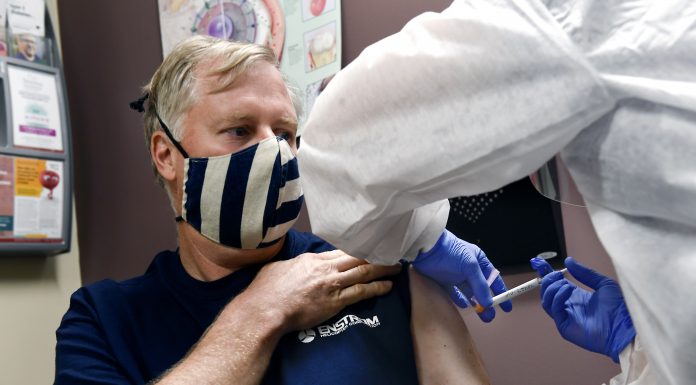(Headline USA) The biggest test yet of an experimental COVID-19 vaccine got underway Monday with the first of some 30,000 Americans rolling up their sleeves to receive shots created by the U.S. government.
The glimmer of hope came even as Google decreed that most of its 200,000 employees and contractors should work from home through next June — a decision that could influence other big companies.
Final-stage testing of the vaccine, developed by the National Institutes of Health and Moderna Inc., began with volunteers at numerous sites around the U.S. given either a real dose or a placebo.
“I’m excited to be part of something like this. This is huge,” said Melissa Harting, a 36-year-old nurse who received an injection in Binghamton, New York.
Another company, Pfizer Inc., announced late Monday that it had started its own study of its vaccine candidate in the U.S. and elsewhere. That study also aimed to recruit 30,000 people.
It will be months before results come in.
Scientists set speed records getting vaccines into massive testing just months after the coronavirus emerged. But they stressed that the public shouldn’t fear that anyone is cutting corners.
“This is a significant milestone,” NIH Director Francis Collins said after the first test injection of Moderna’s vaccine was given, at 6:45 a.m. in Savannah, Georgia. “Yes, we’re going fast, but no, we are not going to compromise” on proving whether the vaccine is safe and effective.
“We are focusing on speed because every day matters,” added Stephane Bancel, CEO of Massachusetts-based Moderna.
After volunteers get two doses a month apart, scientists will closely track which group experiences more infections as they go about their daily routines.
The answer probably won’t come until November or December, cautioned Dr. Anthony Fauci, NIH’s infectious-diseases chief.
Don’t expect a vaccine as strong as the measles vaccine, which prevents about 97% of measles infections, Fauci said, adding he would be happy with a COVID-19 vaccine that’s 60% effective.
Adapted from reporting by the Associated Press.

